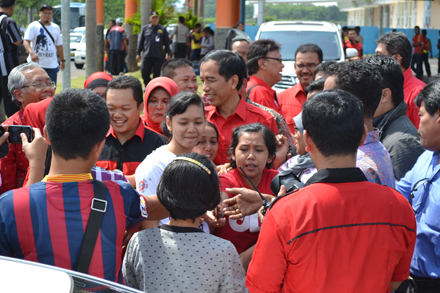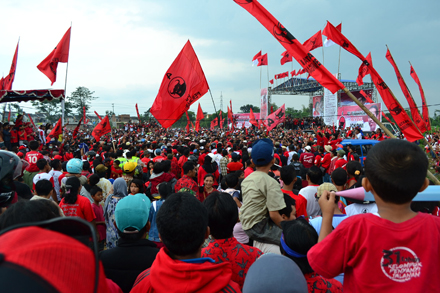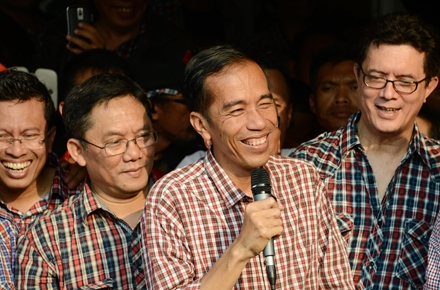The party man
LIAM GAMMON reports from the campaign trail of Indonesian presidential candidate Jokowi, where the challenges of being a party man are rubbing against his image as a ‘man of the people’.
At the back of Malang’s tiny, sugarcane encircled airport, grands fromages from the local branch of the Indonesian Democratic Party-Struggle (PDI-Perjuangan) assemble with excited journalists.
Their anticipation grows as a chartered turboprop drops onto the tarmac after its short flight from Banjarmasin, South Kalimantan. The plane is carrying Joko Widodo (aka Jokowi), Jakarta’s Governor and recently-anointed presidential candidate who local PDI-P figures are counting on to significantly boost the party’s vote in the region.
PDI-P is a pillar of the secular-nationalist stream of Indonesian politics, led by Megawati Sukarnoputri, daughter of independence leader and first president Sukarno and a former president herself. But it’s Jokowi who has, during his time as the wildly popular mayor of Surakarta and governor of Jakarta, become PDI-P’s biggest star.
By now it’s cliché to observe that wherever Jokowi goes, he’s greeted like a celebrity.
What’s interesting to note is that he knows this, that he likes it, and that he goes out of his way to make sure he’s seen in the middle of the rock-star like crush that he’s always met with.
Take his car, for instance.
For his Malang visit, Jokowi specifically asks to be driven in a Kijang, the cheap Toyota van beloved of Indonesian middle class families. The vehicle squats, at the candidate’s request, at the far end of the airport car park. The long walk across the pavement ensured that Jokowi’s photographed by the media while being snapped by near-hysterical members of the public.
More than once on the drive into the city, the motorcade suddenly grinds to a halt, forcing all other traffic to do the same.
At the rear of the motorcade, there are a few panic-stricken faces when it is thought, at first, that there has been an accident at the candidate’s end. The reason for the snarl-ups soon becomes clear; Jokowi had gotten out of his Kijang to press the flesh with bystanders who came out of their houses to see what all the police sirens were about.
 Jokowi shows his PDI-P colours in Malang. Photo by Liam Gammon.
Jokowi shows his PDI-P colours in Malang. Photo by Liam Gammon.
By now the visit to Malang is following the standard Jokowi campaign trip template, with a visit to a cheap restaurant for lunch.
Naturally, this turns into a media circus, just as it was meant to. Apart from the throngs of media, civilians from neighbouring restaurants crowd into the small restaurant to wave, shout ‘long live Jokowi!’, or try their luck at taking a selfie.
After stopping for a quick prayer and photo op at a nearby mosque, it’s time for the main reason for Jokowi’s visit to Malang: the sole scheduled kampanye terbuka (open-air rally) for the local PDI-P branch’s legislative campaign.
Around 2,000 simpatisan (party supporters) gather on a field at the edges of town for the big event. By law it needs to finish by 4pm, and thanks to the candidate’s tardiness it ends up being mercifully brief.
His speech is the political equivalent of a pep talk given by the coach of an under-13′s soccer team before a big game.
If you’ve seen one of these kampanye terbuka, you’ve seen them all—but it is nevertheless always interesting to see Jokowi perform in this context, a big contrast to the food stalls, and neighbourhood streets which he is most comfortable in.
After the national anthem and some overbearing oratory from senior party figures, it is Jokowi’s turn to talk. Though he is clearly more articulate and confident speaker than when he first arrived on the national stage during his 2012 Jakarta gubernatorial campaign, Jokowi’s speech is pretty dismal, containing nothing of substance.
He mentions that he ‘hadn’t slept in three days’, saying that PDI-P supporters shouldn’t either. ‘Let there be nobody here who sleeps at 6 o’clock, or even 8 o’clock in the lead up to the election’, he says somewhat bizarrely.
Telling the crowd to consider how great it would be if PDI-P won enough of the parliamentary vote to not have to enter into a coalition, he makes a self-deprecating joke about his skinny frame and wraps up.
 Jokowi urges supporters not to sleep and tells them he is skinny. Photo by Liam Gammon.
Jokowi urges supporters not to sleep and tells them he is skinny. Photo by Liam Gammon.
The only mitigating factor in all this is that Jokowi—unlike most Indonesian politicians who, completely missing the point of a microphone, decide that the best way to deliver such vacuous and patronising rhetoric is to shout it as loudly as you can—speaks at a reasonable volume.
Jokowi’s never been known for being able to speak convincingly about policy issues in detail, but this was remarkably devoid of even a vague discussion of policies or ideology.
The reason for this, says a senior official from PDI-P head office, is that the party (specifically, Megawati) forbids him from talking about ‘programs and governing ideas’ during the legislative campaign. What this is all about is simply ensuring the voters associate the PDI-P brand with Jokowi—not for giving the candidate a platform to start making promises.
The side-effect of this is that, when taken out of the blusukan (impromptu visits) and casual media conferences where his appeal is showcased and onto the stage at a party rally, Jokowi begins to look and talk like every other Indonesian politician—interesting, given how much of his political success is due to his carefully-cultivated image that he is very much different from the hacks the electorate is used to.
Jokowi is known to regard this style of campaigning as a bit of a drag, and would rather stick to what he is good at. I doubt that any of this does him grievous political harm. Nevertheless, it is in a way symbolic of what happens when the outsider becomes the figurehead of an uber-establishment party, trading his checked shirt for PDI-P colours.
But the fleas, as it were, come with the dog.
Jokowi obviously feels that he must pay his dues, having been handed the nomination without a public conflict with the party brass over it, and this is why the campaign trip template now includes events at which he blends into the crowd of PDI-P hacks around him. Local party officials are certainly excited that he is on board, saying that his candidacy has improved morale and that it’ll definitely win votes. Jokowi’s efforts at campaigning for the party are appreciated by the grassroots, and it is certainly in his interests in the short run that the goodwill is maintained.
Inevitably, Jokowi the plucky outsider and Jokowi the party man are two personas which sit uneasily with each other. Despite its pretensions of being the party of the common man, and the vaguely populist worldview which many of its functionaries share, PDI-P is more than capable of being as corrupt and reactionary as any other section of the Indonesian political establishment.
Yet Jokowi has overwhelmed his rivals in the past with the sheer force of the popularity he’s cultivated through his own populist political strategy, and there’s no reason to dismiss its potential effectiveness in the future.
It will be fascinating to see, after the votes are counted on 9 April, if Jokowi chooses once again to embrace his outsider schtick—exchanging the PDI-P jersey for his old checked shirt.
Liam Gammon is a PhD student in the Department of Political and Social Change at the Australian National University’s College of Asia and the Pacific.
This article forms part of New Mandala’s coverage of Indonesia’s two upcoming elections, the first of which takes place on 9 April.







